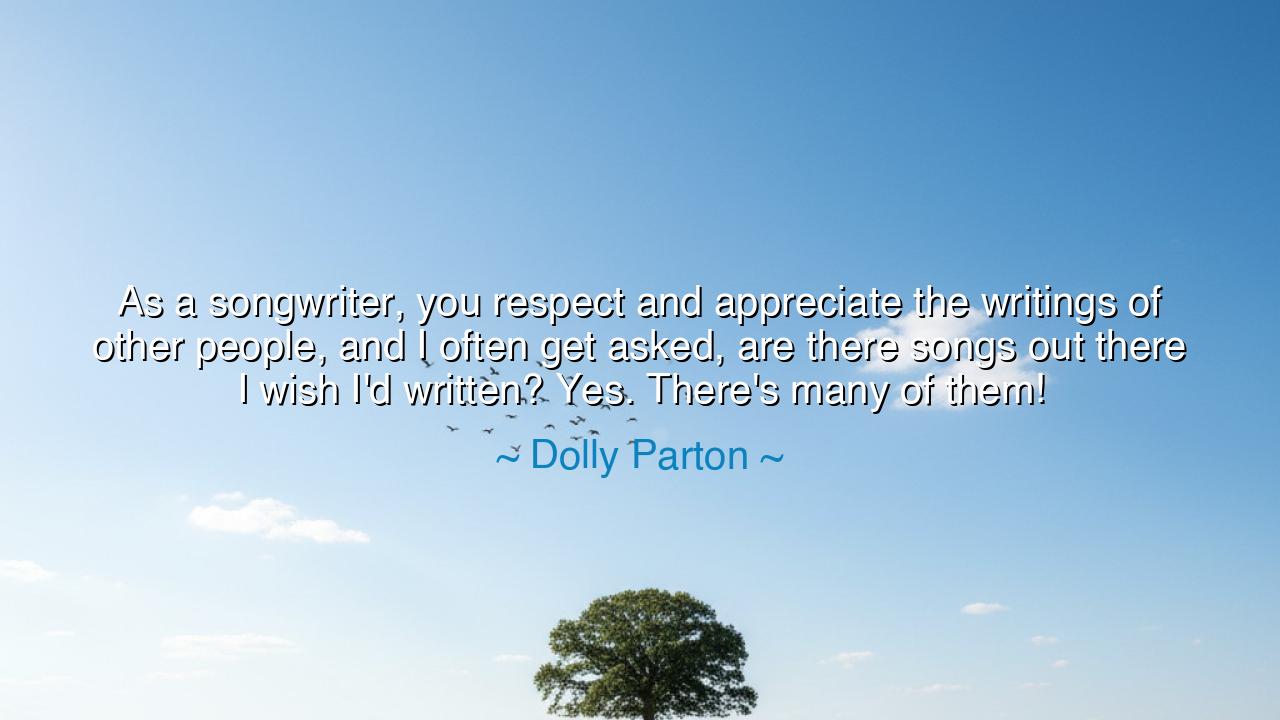
As a songwriter, you respect and appreciate the writings of other
As a songwriter, you respect and appreciate the writings of other people, and I often get asked, are there songs out there I wish I'd written? Yes. There's many of them!






The words of Dolly Parton—“As a songwriter, you respect and appreciate the writings of other people, and I often get asked, are there songs out there I wish I'd written? Yes. There's many of them!”—speak with the radiant humility of one who knows that true artistry is not born from pride, but from reverence. In her voice, we hear not envy, but gratitude. For she understands a truth as old as poetry itself: that all creators drink from the same river, each adding their own ripples to its endless flow. No song, no poem, no painting exists alone—it is part of the eternal dialogue between souls who have loved, suffered, dreamed, and sung since the dawn of time.
In the ancient world, the Greeks spoke of the Muses, divine daughters of memory, who inspired mortals to create. They taught that creativity was not possession, but participation—that the song did not belong to the singer, but to the spirit that moved through them. Dolly Parton, in her simplicity and wisdom, echoes that same truth. When she says she admires the works of others, she acknowledges that beauty is not a competition but a communion. The artist who envies another’s creation does not yet understand the sacred nature of art—but the artist who honors it, as Dolly does, becomes part of something eternal.
This humility is the mark of greatness. Consider the story of Johann Sebastian Bach, whose genius shaped centuries of music. Near the end of his life, when asked how he composed such divine works, he said, “I was obliged to be industrious. Whoever is equally industrious will succeed equally well.” Even in his brilliance, Bach bowed to the idea that inspiration belongs not to one man but to the divine current that flows through all who labor in love. Dolly’s words mirror this spirit: though she herself has written songs that have touched millions, she remains a student of beauty, always listening, always learning. In her, the muse finds both vessel and servant.
There is a quiet nobility in this kind of respect. To love another’s song is to admit that truth can wear many voices. Each songwriter, each poet, each storyteller, captures a fragment of the same great mystery—the human heart. When Dolly confesses that there are songs she wishes she had written, she is not expressing regret; she is expressing awe. She is saying, “How wondrous it is that someone else has given shape to the feeling I too have known.” Such humility transforms admiration into kinship, and competition into harmony.
Think also of Leonardo da Vinci, who, despite his own mastery, studied endlessly the works of his predecessors. He once wrote, “He who can copy, can create.” For to appreciate deeply is to understand deeply, and from understanding springs creation. Dolly’s heart works in the same way: her love for others’ songs becomes fuel for her own. By listening with reverence, she renews her own artistry. The ancient masters would call this the cycle of inspiration—the passing of the creative flame from one soul to another, never diminishing, always brightening the world.
There is also, within her words, a gentle reminder of humility in mastery. Many who achieve fame forget the soil from which they grew. But Dolly, rooted in the mountains of Tennessee, has never lost sight of the shared humanity behind every melody. She knows that no artist stands alone, that her own voice is intertwined with the voices of those who came before and those who will come after. Like a tree whose branches reach high only because its roots grow deep, her greatness is nourished by her gratitude.
The lesson of her quote is this: to be a creator is also to be a listener. To be a writer, a painter, a musician—or even a dreamer—is to stand humbly before the greatness of others and let their light kindle your own. Do not fear admiration; let it teach you. Do not envy another’s brilliance; let it inspire you. The moment you begin to see beauty as a shared gift rather than a prize to be won, you join the fellowship of those who create not for glory, but for love.
So, my child, if ever you feel small beside another’s masterpiece, remember Dolly Parton’s wisdom. Stand before it not with envy, but with reverence. Say, “How beautiful that this truth exists in the world.” Then return to your work, your craft, your song—and add your voice to the chorus. For though there are many songs one might wish to have written, the truest art is not to possess, but to contribute—to let your own light join the constellation of all who came before. In that harmony lies the essence of creation itself: the blending of many souls into one eternal song.






AAdministratorAdministrator
Welcome, honored guests. Please leave a comment, we will respond soon